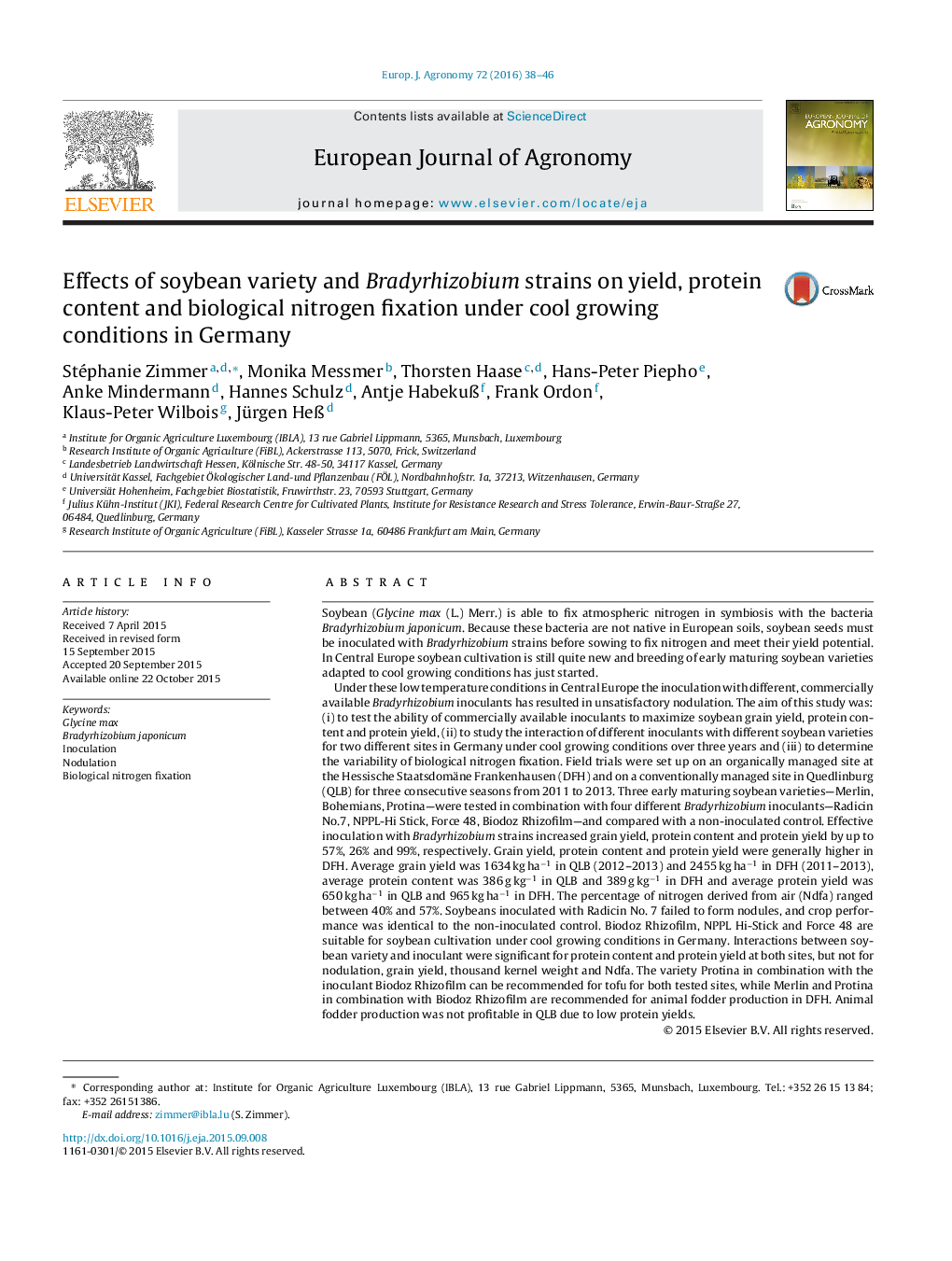| کد مقاله | کد نشریه | سال انتشار | مقاله انگلیسی | نسخه تمام متن |
|---|---|---|---|---|
| 4508709 | 1624453 | 2016 | 9 صفحه PDF | دانلود رایگان |
• Early maturing cultivars and efficient Bradyrhizobia products enable soybean cultivation.
• High protein content for tofu can be achieved under cool growing conditions in Germany.
• Significant interactions between soybean variety and inoculant were observed.
Soybean (Glycine max (L.) Merr.) is able to fix atmospheric nitrogen in symbiosis with the bacteria Bradyrhizobium japonicum. Because these bacteria are not native in European soils, soybean seeds must be inoculated with Bradyrhizobium strains before sowing to fix nitrogen and meet their yield potential. In Central Europe soybean cultivation is still quite new and breeding of early maturing soybean varieties adapted to cool growing conditions has just started.Under these low temperature conditions in Central Europe the inoculation with different, commercially available Bradyrhizobium inoculants has resulted in unsatisfactory nodulation. The aim of this study was: (i) to test the ability of commercially available inoculants to maximize soybean grain yield, protein content and protein yield, (ii) to study the interaction of different inoculants with different soybean varieties for two different sites in Germany under cool growing conditions over three years and (iii) to determine the variability of biological nitrogen fixation. Field trials were set up on an organically managed site at the Hessische Staatsdomäne Frankenhausen (DFH) and on a conventionally managed site in Quedlinburg (QLB) for three consecutive seasons from 2011 to 2013. Three early maturing soybean varieties—Merlin, Bohemians, Protina—were tested in combination with four different Bradyrhizobium inoculants—Radicin No.7, NPPL-Hi Stick, Force 48, Biodoz Rhizofilm—and compared with a non-inoculated control. Effective inoculation with Bradyrhizobium strains increased grain yield, protein content and protein yield by up to 57%, 26% and 99%, respectively. Grain yield, protein content and protein yield were generally higher in DFH. Average grain yield was 1634 kg ha−1 in QLB (2012–2013) and 2455 kg ha−1 in DFH (2011–2013), average protein content was 386 g kg−1 in QLB and 389 g kg−1 in DFH and average protein yield was 650 kg ha−1 in QLB and 965 kg ha−1 in DFH. The percentage of nitrogen derived from air (Ndfa) ranged between 40% and 57%. Soybeans inoculated with Radicin No. 7 failed to form nodules, and crop performance was identical to the non-inoculated control. Biodoz Rhizofilm, NPPL Hi-Stick and Force 48 are suitable for soybean cultivation under cool growing conditions in Germany. Interactions between soybean variety and inoculant were significant for protein content and protein yield at both sites, but not for nodulation, grain yield, thousand kernel weight and Ndfa. The variety Protina in combination with the inoculant Biodoz Rhizofilm can be recommended for tofu for both tested sites, while Merlin and Protina in combination with Biodoz Rhizofilm are recommended for animal fodder production in DFH. Animal fodder production was not profitable in QLB due to low protein yields.
Journal: European Journal of Agronomy - Volume 72, January 2016, Pages 38–46
